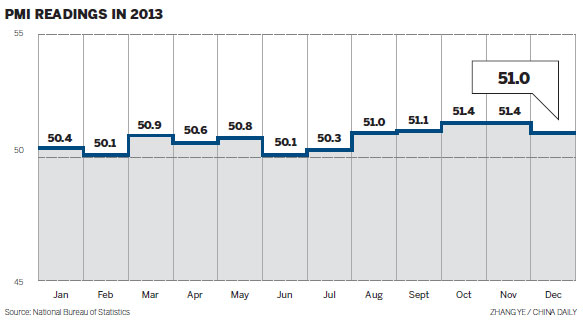PMI falls to lowest level since Aug
By Chen Jia in Beijing and Yu Ran in Shanghai (China Daily) Updated: 2014-01-02 08:09
"A key task for 2014 macroeconomic policies is to expand domestic demand in order to stabilize the overall economic growth, as well as to be careful about a possible sharp contraction of exports because the international environment is complicated," said Chen.
Zhang Rui, the owner of Chuangsi Optical Spectacles Co Ltd in Wenzhou, Zhejiang province, said: "There was a slight growth in the number of orders from overseas for Christmas and the New Year from August to October. The off-peak season for export trading arrived in November with quite substantial incoming demand."
His company aimed to achieve a 20 percent growth rate in profit for 2013 but managed to obtain about 10 percent because overall exports remained sluggish over the past year.
Ye Mingchun, the manager of Zhejiang Tianyiqi Shoes Co Ltd, based in Taizhou, Zhejiang province, said: "There was no obvious sign a recovery had arrived with a great number of orders for 2014, but the situation seemed to be improving with more new clients sending e-mails about requirements for products from December."
He added that most manufacturing enterprises are trying to make a comeback by upgrading their designs and quality in order to gear the market toward high-end customers.
Some economists warned that compared with large companies, small producers face a tough road.
According to official data, the PMI for small companies dropped to 47.7 in December, compared with 48.3 in November, indicating a production contraction. The figure for medium-sized companies fell to 49.9 from 50.2.
Meanwhile, large factories' PMI was 52 in December, lower than its figure of 52.4 in November.
Supportive measures are needed to sustain the growth of small businesses, which can strengthen entrepreneurs' confidence, said Chen from the China Federation of Logistics and Purchasing.
Lian Ping, chief economist at the Bank of Communications Co Ltd, said small businesses will face much bigger operational pressures when exchange rate fluctuations occur if the United States decides to end its quantitative easing policy.
"Rising domestic loan interest rates will also increase capital costs of producers," Lian said. "Therefore, further tax cuts for small companies are necessary in 2014."
- NHTSA says finds no 'defect trend' in Tesla Model S sedans
- WTO rare earth ruling is unfair
- Amway says 2014 China sales may grow 8%
- President Xi in Europe: Forging deals, boosting business
- CNOOC releases 2013 sustainability report
- Local production by Chery Jaguar Land Rover this year
- Car lovers test their need for speed in BMW Mission 3
- China stocks close mixed Monday

















